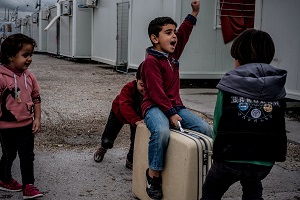Global agreements on migration and refugees should include commitments to protect children, UNICEF urges world leaders
Ahead of international meeting on migration in Puerto Vallarta, Mexico, UNICEF releases blueprint for how to protect children on the move
The rights, protection and wellbeing of uprooted children should be central commitments of global migration policies, UNICEF said on Nov 30 ahead of a meeting in Puerto Vallarta, Mexico, on safe, regular and orderly migration.

Seven-year old Louay, six-year old Ayman, six-year old Manena and six-year old Wael play with a suitcase that they found in the garbage at the Skaramagas refugee camp, in the port area of northern Athens, Greece.
The 4 to 6 December meeting is a major step toward drafting the Global Compact for Migration, a landmark intergovernmental agreement that will cover all dimensions of international migration. It is the moment when world leaders will begin to forge consensus on political and financial commitments in line with the New York Declaration for Refugees and Migrants and the Convention on the Rights of the Child.
In advance of the meeting, UNICEF also released ‘Beyond Borders: How to make the global compacts on migration and refugees work for uprooted children’ ¬– a new report that highlights best practices for the care and protection of refugee and migrant children. The report includes practical examples of governments, civil society partners and host communities working to support and integrate uprooted children and their families.
“Global leaders and policymakers convening in Puerto Vallarta can work together to make migration safe for children,” said Ted Chaiban, UNICEF Director of Programmes. “Our new report shows that it is possible, even in countries with stretched resources, to implement policies, services and investments that effectively support refugee and migrant children in their countries of origin, as they transit across borders and upon reaching their destinations.”
Refugee and migrant children are especially vulnerable to xenophobia, abuse, sexual exploitation, and lack of access to social services. It is imperative to have policies in place to protect them over the course of their journey, the report says.
The report presents successful case studies from around the world, including the implementation of minimum protection standards for refugee children in Germany, cross border child protection systems in West Africa, and finding alternatives to the detention of migrant children in Zambia. Other countries featured in the report include Afghanistan, Italy, Jordan, Lebanon, South Sudan, Vietnam, Uganda and the U.S. Each of the initiatives can be replicated in different contexts and inform child-focused actions and policy change at national, regional and global levels to be agreed in the framework of the Compact.
The report also presents UNICEF’s six-point agenda for action as a basis for policies to protect refugee and migrant children and ensure their wellbeing:
1. Protect child refugees and migrants, particularly unaccompanied children, from exploitation and violence;
2. End the detention of children seeking refugee status or migrating, by introducing a range of practical alternatives;
3. Keep families together as the best way to protect children and give children legal status;
4. Keep all refugee and migrant children learning and give them access to health and other quality services;
5. Press for action on the underlying causes of large scale movements of refugees and migrants;
6. Promote measures to combat xenophobia, discrimination and marginalization in countries of transit and destination.
Source:United Natins Children's Fund
- 243 reads
Human Rights
Ringing FOWPAL’s Peace Bell for the World:Nobel Peace Prize Laureates’ Visions and Actions

Protecting the World’s Cultural Diversity for a Sustainable Future

The Peace Bell Resonates at the 27th Eurasian Economic Summit

Declaration of World Day of the Power of Hope Endorsed by People in 158 Nations

Puppet Show I International Friendship Day 2020

